新编大学英语第一册教案
全新版大学英语第一册教案
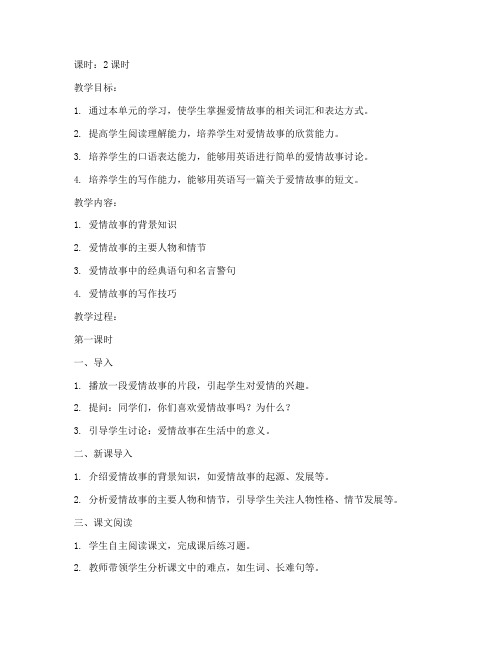
课时:2课时教学目标:1. 通过本单元的学习,使学生掌握爱情故事的相关词汇和表达方式。
2. 提高学生阅读理解能力,培养学生对爱情故事的欣赏能力。
3. 培养学生的口语表达能力,能够用英语进行简单的爱情故事讨论。
4. 培养学生的写作能力,能够用英语写一篇关于爱情故事的短文。
教学内容:1. 爱情故事的背景知识2. 爱情故事的主要人物和情节3. 爱情故事中的经典语句和名言警句4. 爱情故事的写作技巧教学过程:第一课时一、导入1. 播放一段爱情故事的片段,引起学生对爱情的兴趣。
2. 提问:同学们,你们喜欢爱情故事吗?为什么?3. 引导学生讨论:爱情故事在生活中的意义。
二、新课导入1. 介绍爱情故事的背景知识,如爱情故事的起源、发展等。
2. 分析爱情故事的主要人物和情节,引导学生关注人物性格、情节发展等。
三、课文阅读1. 学生自主阅读课文,完成课后练习题。
2. 教师带领学生分析课文中的难点,如生词、长难句等。
3. 学生分组讨论课文内容,分享自己的理解。
四、课堂活动1. 学生分组进行角色扮演,模拟爱情故事中的对话。
2. 教师点评学生的表演,指出优点和不足。
第二课时一、复习导入1. 复习上一节课的内容,检查学生对爱情故事的了解程度。
2. 引导学生总结爱情故事中的经典语句和名言警句。
二、课文阅读1. 学生自主阅读课文,完成课后练习题。
2. 教师带领学生分析课文中的难点,如生词、长难句等。
3. 学生分组讨论课文内容,分享自己的理解。
三、写作训练1. 教师讲解爱情故事的写作技巧,如人物塑造、情节安排等。
2. 学生根据所学内容,用英语写一篇关于爱情故事的短文。
3. 学生互评作文,教师点评学生的写作水平。
四、总结与拓展1. 总结本单元的学习内容,强调爱情故事在大学英语学习中的重要性。
2. 拓展:推荐一些优秀的爱情故事书籍和电影,供学生课后阅读和观看。
教学评价:1. 学生在课堂活动中的参与度,如角色扮演、讨论等。
2. 学生对爱情故事的阅读理解能力,如课后练习题的完成情况。
新编大学英语1教案

教学目标:1. 通过本单元的学习,使学生掌握相关词汇和语法知识,提高英语听说读写能力。
2. 培养学生运用英语进行交流的能力,增强学生的跨文化交际意识。
3. 帮助学生了解并关注社会热点话题,提高学生的思辨能力。
教学内容:1. 词汇:本单元重点词汇包括:environmental protection、energy-saving、public transportation等。
2. 语法:现在进行时态的构成和用法。
3. 听力:听懂日常生活中的对话,了解不同文化背景下的交流方式。
4. 阅读:阅读关于环境保护的文章,提高阅读速度和理解能力。
5. 写作:撰写一篇关于环境保护的短文,锻炼写作能力。
教学过程:一、导入1. 用PPT展示本单元的词汇和语法,让学生初步了解学习内容。
2. 引导学生思考:环境保护对于我们每个人来说意味着什么?二、词汇教学1. 教师带领学生朗读本单元的词汇,让学生熟悉发音和拼写。
2. 通过例句讲解词汇在句子中的用法,让学生学会运用词汇。
3. 进行词汇练习,巩固所学词汇。
三、语法教学1. 教师讲解现在进行时态的构成和用法,通过例句让学生理解。
2. 学生进行语法练习,巩固所学语法知识。
四、听力教学1. 播放听力材料,让学生听懂对话内容。
2. 针对听力材料进行提问,检验学生对对话内容的理解。
3. 学生分组讨论,分享听力材料中的文化差异。
五、阅读教学1. 学生阅读关于环境保护的文章,了解文章大意。
2. 教师提问,引导学生深入理解文章内容。
3. 学生分组讨论,分享阅读心得。
六、写作教学1. 教师讲解写作要求,指导学生撰写关于环境保护的短文。
2. 学生进行写作练习,教师给予个别指导。
3. 学生展示写作成果,互相评价。
七、课堂小结1. 教师对本单元的学习内容进行总结,强调重点和难点。
2. 学生分享学习心得,提出疑问。
教学反思:1. 本节课的教学内容丰富,教学方法多样,有助于提高学生的英语综合能力。
2. 学生在课堂上的参与度较高,能够积极参与讨论和练习。
新编大学英语 1 Unit 1 教案

Unit 1 loveI. Teaching aims: 1. to do some preparation activities such as discussion, group work, etc. topractice the students’ spoken skill and communicative skills;2. to grasp some new words and try to use these words which help themenrich their vocabulary;3. to discuss love and some one “you” love;4. to do some post-reading exercises and some after-class reading to practicewhat they have got to know in class to improve their English comprehensiveskills.II. key points: 1. learn to introduce oneself, one’s family as well as one’s hobbies;2. to talk about a love story that impress you most.III. difficult points: 1. to paraphrase some difficult sentences and catch their meaning.2.to grasp some useful words and phrases to describe a love story.IV. teaching procedures:4.1 warming up (preparation):1) Why do we have all kinds of emotions?2) Where do emotions come from?head ,heart3) Which one is the most desirable among all the emotions?4) Love: all kinds of love4.1.1 getting to know each otherUseful phrases:(your hometown): province, city, county, town, village,(your high shcool) public school, experiment school, affiliated middle school, middle school attached/affiliated to… (……附中),college entrance examination4.1.1.1 Ask the students to write down some words about hobbies, doing sports, characters on thethe words mentioned above.Sample A:I came from the city of Chaohu, Anhui province. The city is so named because there is a big lake lying in the middle of the city. Our city is not a big one. It’s just like a small town. People living in the city are kind and warm-hearted.Sample B:My name is Wei Xiao. I come from a nuclear family. That means I’m a single child. I came from Ji’nan, the capital city of Shandong province. In the past th ree years, I studied at the high school attached to Shandong University, a key high school in my hometown. I like all kinds of sports. Basketball, football, and tennis are my favorite games. And I also like to listen to music, especially popular music.4.1.2 getting to know the members of the family:Ask the students to talk about their family members with their partners (including their jobs their hobbies and their characters)1) Video: The Stewarts family tree2) Sara’s family tree3) Work out your own family treeCommon family relationships:Grandfather, grandmother, mother, father, uncle, aunt, brother, sister, cousin, brother-in-law, sister-in-law, nephew, niece, grandson, granddaughter4.1.3 talk about love1) a definition of “love”Love is a deep feeling of fondness, affection and friendship that grows between members of a family or between people of the opposite sex. Love is a universal emotion that expresses itself in every culture.To love is to be human, to be loved is also to be human.Love is a deep feeling of fondness, affection and friendship that grows between members of a family or between people of the opposite sex. Whether it is a mother’s nurturing love for her child, a son’s loyal love for his father, the love between husband and w ife, the love between friends, love is a universal emotion that expresses itself in every culture.Many of the famous romantic love stories in various cultures( such as Liangshanbo and Zhuyingtai , Romeo and Juliet, Jack and Rose in the film “Titanic”) end in the tragedies of death or betrayal ( 背叛). The loss of love is a favorite musical theme ( 主题) and the subject of countless stories, songs and ballads ( 诗歌).To love is to be human, to be loved is also to be human.2)There are many kinds of love in the world. Can you mention some of them?a mother’s love for her children, a son’s love for his father, the love between husband and wife, the love between friends, puppy love, love of one’s country…3) talk about someone you loveUseful expressions:ambitious considerate cordial diligent easy-going generous intelligent patient persevering respectable thoughtful thrifty hardworking good-looking friendly honestI love my mother most, because she's always very kind to me, unlike my father who will scold me, or slap me if I make mistakes or if I am naughty. My mother is an ordinary-looking woman, but in my eyes she is very beautiful. She is very hard-working and does almost all the housework. When I was working for the en-trance examinations, she was very considerate and never let me do any,housework. When I was hungry at night, she would fix a snack for me. She is a good cook. It's a pity that I am not able to have what she cooks because I am far away from home.4.2 listening-centered activitiesTask 1: the importance of loveTask 2: vedio clipListen to the tape and answer the following questions.A Poem: What Makes A Dad ?V. reading centered activities:5.1 pre-reading questionsWhile you are walking in the street, you often meet with disabled persons. On other occasions, you may know some disabled persons in your neighborhood. What kind of feelings you have toward them? Do you feel sorry for them? Is your heart filled with sympathy? Or are you always ready to help them? If you know anyone who is disabled, please talk about your feelings about him or her.1) Can you imagine the world of the handicapped (their life and feelings)?2) What’s your feeling/attitude towards the handicapped?Hint:feel pity for hide Intolerable look away in embarrassment recognize sb. as an ordinary person be oneself manage to ignoresample answers:When I see a disabled person on the street I feel sorry for him/her. I know a disabled person whose leg has been broken when he was young. But he did not lose heart. He makes a living by repairing radios and watches for others. He often repairs radios and watches free of charge. I admire his courage to face difficulties.I don’t think our country has done enough for the disabled. For example, some colleges refuse to admit disabled students. In many buildings, there aren’t any special routes for the disabled, as there are in Japan and the U.S. So I think we should do something to help the disabled.3) How do you feel if you were seen to be with to a handicapped person and if he were one of thefamily members you love most?Hint:strong-minded body/mind/spirit not give up set an example learn from physically mentally live a hard life laugh at unsympathetic cold-blooded justified call for sample answer:I know many people who are disabled physically but are very strong-minded. Take ZhangHaidi for example, though she is seriously ill in body, she is very healthy in mind. She nevergives up I life. She’s set an example for many people, both the fortunate and the unf ortunate. I think we should all learn from her and never give up when faced with difficulties.The disabled people are sometimes living in misery, especially the mentally disabled. A neighbor of mine, who was born low-intelligent, has been deserted by his family since the day I remembered things. He has to live on begging. Neither are the people sympathetic. I wonder why people are so cold-blooded. Shouldn’t he be better taken care of? Here, I call for sympathy to the disabled. And I wish laws be made not to look down upon the disabled people.5.2 new words and phrases:1) adjust: adjust to sb./sth.①If you adjust something such as your clothing or a machine, you correct or alter its positionor setting.I must adjust my watch, it is slow.②When you adjust to a new situation, you get used to it by changing your behavior or your ideas.I have adjusted to the new environment in university.When you go abroad, you have to adjust yourself to the new time zone.adjust to energy shortage 适应能源短缺③If you adjust something, you change it so that it is more effective or appropriate.adjust expenses to income 量入为出You can adjust the car seats to the length of your legs.④If you adjust your vision or if your vision adjusts, the muscles of your eye or the pupils alter to cope with changes in light or distance.His eyes need several minutes to adjust to the dimness.adjust, fit 与suitadjust 强调调整自身以适应新的环境或新的需要,能和反身代词及介词to连用。
《新编大学实用英语英语教程》(林立总主编)第一册教案

教案课程名称大学英语1教案书写规范与要求一、以每次课为一个备课单元书写。
二、每一备课单元书写下列内容:1.周次、课次、授课时间、章节名称;2.简要说明:教学目的、重点、难点、教学方法和授课手段(包括与课程相关的上机和实验、课件制作等);3.教学主要内容(教案主体)及教学方法手段;4.作业内容。
注:其余授课电子版文件待本课程结束后,交教务处统一刻成光盘存档。
大学英语1 课程授课总体计划书厦门软件职业技术学院教案厦门软件职业技术学院教案厦门软件职业技术学院教案厦门软件职业技术学院教案5 We are surprised at his great __improvement__(improve) in English.Activity 5 Fill in the blanks with the proper form of the words and phrases given in the box.1We got tired of his _endless_ boring speech.2 _Chatting_with friends is a good way of relaxation.3 Our country is rich in natural_resources__.4 Upon arrival,the singer are surrounded by a lot of fans and reporters.5 Tom _spends a lot of time in playing computer games every day.6To my surprise,only a third of the students in my class are interested in skiing.7He seems so quiet,but _actually he likes talking.8These days all the college students are very busy,especially the seniors.9 I sent her a bunch of flowers as a (an) expression of gratitude.10 Our college offers an excellent art program .Step II Grammar代词(Pronouns)一代词的分类二代词的用法1 人称代词注意:(1)人称代词在比较分句中作主语,用主格;作宾语,用宾格,如:She works harder than I (do).她比我用功。
新编大学英语 1 Unit 10 教案

Unit 10 Man and AnimalsI. Teaching aims:1.to do some preparation activities such as discussion, groupwork to practice the students’ spoken skill and communicativeskills;2. to grasp some new words and try to use these words which helpthem enrich their vocabulary;3. to discuss the significance of protecting animals andenvironment;4. to do some post-reading exercises and some after-class readingto practice what they have got to know in class to improve theirEnglish comprehensive skills.II. key points: 1. to learn the relationship between man and animals;2. talk about the ways to protect wild animals from extinction and theimportance of environmental protection.III. difficult points: 1. to paraphrase some difficult sentences and catch theirmeaning.2. to grasp some useful words and phrases to related to travel. IV. teaching process:i. preparation1. Work in groups. Try to name as many animals as possible and write them on the blackboard.bird butterfly peacock bee dove pigeon eagle cuckoo bat chicken duck cock goose parrot hen swan cat seagull crow deer sparrow dog mule swallow rat owl dragonfly pig ass horse ox goat dolphin bull cow calf lion zebra tiger camel panda fox bear leopard elephant wolf snake whale hare rabbit seal snail mosquito sheep donkey mouse monkey2. Listen to the story “Noah’s Ark”. Then discuss in groups the following question. If you were Noah, which animal would you not want to take with you? Why not?Noah lived a long, long time ago. he was a good man. God told Noah to build an ark and to gather his family and two of every animal (one female and one male) into the ark because it was going to rain and the world was going to be destroyed.So Noah gathered two of every animal including skunks, elephants, giraffes, cows, and even snakes! It rained for 40 days and 40 nights. After the rain stopped, the water dried up. One year later, Noah let animals out of the ark. Some went to Africa, some to Asia, and some to Australia, Europe, and America.God promised never to destroy the earth again with water. And as a promise, God gave us the rainbow.ii. reading-centered activities1. introductionSince we live in such crowded cities, it is reasonable that too much aggressiveness showed in our performances. Some psychologists believe that aggression is a basic human instinct. The passage suggests that hostility and aggression be expressed inconstructives and non-violent competitions.2. Are you frightened of dogs? If so, why?3. When are animals aggressive?Animals are aggressive when they are frightened, when they want to protect their young, when they are attacked or hurt, and when they are put in a corner or a small space.4. What will man do if they live in crowded cities?People may behave aggressively toward each other.5. What is the possible solution for man’s hostility and aggression?The encouragement of competition in all possible fields would diminish the likelihood of people’s aggressive behavior. When people take parts in internation al competitions in sports or for the best designed house, or the safest car, they can channel their aggression into non-violent competition and constructive activity.6. words and phrases:1) aggression (n.) (Tittle)侵略;敌对的情绪或行为;攻击行动构词法:adj. aggressive (Line 1, Para. 1) 好争吵的;有进取心的;有冲劲的adv. aggressively好斗地;挑衅性地;好争吵地n. aggressiveness敌对情绪n. aggressor(正式;贬义) 侵略者男孩子总是通过打架来表现他们的敌对情绪。
新编大学基础英语综合教程第一册教案

教学方式、手段、媒介:
教学方式(Teaching method):
1. lecture
2. role play
讨论、思考题、作业:
1. Organize the students into groups to complete theinformationfor your group members as well as yourself, which may include:
Then ask one student from each group to report the results of their interview.
efulExpressions:*
1) at a wedding
2) at a disco
3) on holiday
4) be/come from
5) hi, there
6) date of birth
7) in lower case
8) in capitals
2. Language Focus on?
Reading
Understand short texts describing jobs and morning routines and read a snack bar menu.
Language quality
Use determiners and possessive pronouns, the Present Simple.
2. Assign the exercise after the text.
大学英语全新版第一册unit 1 教案

Page 2 of 10
《大学英语》第一册教案 大学英语》 New College English---Book 1/Unit 1
1. The idea of becoming a writer …. took hold. → Ever since I was a child in Belleville, I had thought of becoming a writer from time to time, but I didn’t make up my mind until I was in the eleventh grade. 2. off and on → from time to time, now and again, irregularly. e.g.
《大学英语》第一册教案 大学英语》 New College English---Book 1/Unit 1
授 课 标 题 授 课 教 师
Unit One
系 别 教学目标
Growing
班 级
Up
授 课 时 间
Teaching Objectives
Students will be able to: 1. Grasp the main idea and structure of the text. 2. Appreciate the difference between comparison and contrast, as well as different ways to compare and contrast (point-by-point method or one-side-at-a-time method). 3. Master the key language points and grammatical structures in the text. Conduct a series of reading, listening, speaking and writing activities related to the theme of the unit.
新编英语教程1第三版教学设计
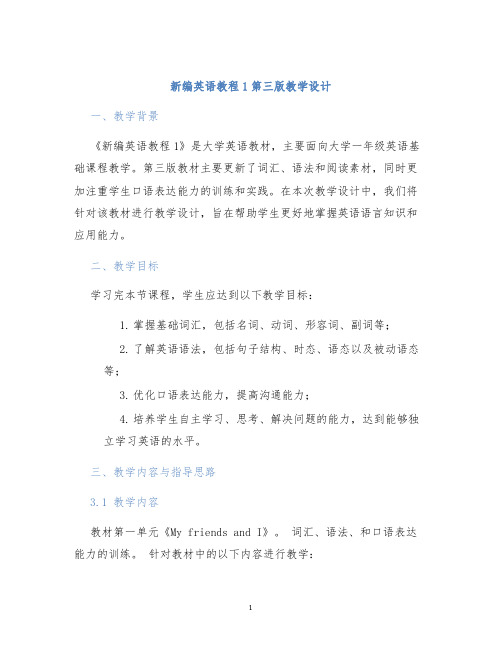
新编英语教程1第三版教学设计一、教学背景《新编英语教程1》是大学英语教材,主要面向大学一年级英语基础课程教学。
第三版教材主要更新了词汇、语法和阅读素材,同时更加注重学生口语表达能力的训练和实践。
在本次教学设计中,我们将针对该教材进行教学设计,旨在帮助学生更好地掌握英语语言知识和应用能力。
二、教学目标学习完本节课程,学生应达到以下教学目标:1.掌握基础词汇,包括名词、动词、形容词、副词等;2.了解英语语法,包括句子结构、时态、语态以及被动语态等;3.优化口语表达能力,提高沟通能力;4.培养学生自主学习、思考、解决问题的能力,达到能够独立学习英语的水平。
三、教学内容与指导思路3.1 教学内容教材第一单元《My friends and I》。
词汇、语法、和口语表达能力的训练。
针对教材中的以下内容进行教学:1.人称代词和物主代词的使用;2.简单时态(现在时、过去时以及将来时)的使用;3.动词的被动语态;4.多种句子结构的使用;5.常用的日常英语口语表达。
通过多种学习方式,全面提高学生英语语言综合素养和应用能力,达到英语语言沟通的基本要求。
3.2 指导思路1.提高学生的学习兴趣,增强学习主动性和积极性。
通过小组讨论、课堂问答、真实场景模拟等方式,让学生感知英语语言的巨大魅力,提高主动学习的意识。
2.基于学生的实际掌握水平,采用多种教学手段。
无论是针对词汇的阅读训练、语法知识的梳理与模拟训练,还是口语交际能力的提升,本次教学肯定有多种形式的练习活动。
3.系统性地传授英语语言知识,严格把关学习效果。
逐步推进解题思路,梳理重点难点知识体系,切实提高学生英语语言的全面分析及解决问题的能力。
三、教学过程3.1 教学方法采用多种教学方法:1.讲授;2.互动交流;3.问答;4.课外练习。
3.2 教学流程第一步:引入通过一些真实的英语场景让学生感受到英语语言实际应用的价值。
第二步:阅读理解通过阅读教材,让学生掌握重要词汇和英语语言的基础语法知识,并通过练习巩固记忆。
新编大学基础英语综合教程第一册教案

新编⼤学基础英语综合教程第⼀册教案本科课程教案2017-2018 学年(第 1 学期)课程名称:⼤学英语CI课程性质:□通识必修课□⼤类基础课□专业核⼼课□专业拓展课□通识限选课□通识任选课授课班级:17产品设计1班(32⼈)、环境设计七班(30⼈)学⽣数:共62⼈授课教师:庞海才学分/学时:6/75学时分配:理论讲授学时,课堂讨论学时实验/课内实践学时,在线学习学时课程设计(周)系(教研室)负责⼈(签名):主管教学院长(签名):审核通过⽇期:年⽉⽇Unit 4 What’s On?I.教学⽬标ObjectivesStudents will be able to:Talk about free time activitiesMatch descriptions to photosIntroduce and practise the use of the -ing verb form after go, like and love Use expressions of frequency to talk about habits in a quizII. 课时安排Time Allotment(体现重点、难点)1st period:Lesson 1)2nd period: Lesson 23rd period: Lesson 34th period: Lesson 4III. 教学⽅法与⼿段Teaching MethodologyStudent-centered approachStudent-centered learning requires students to be active, responsible participants in their own learning. Instead of lecturing through the whole class, the teacher t akes students interests into account, follows their passions, capitalizes on their strengths and helps students form a strong learning community.Task-based approachThe main aim of this approach to learning is task completion. Usually, relevant and interesting tasks are set by the teacher and students are expected to draw on their pre-existing knowledge of English to complete the task.IV. 教学内容及过程Tasks and ProcessLesson 1 Time OutLexical PreparationVocabulary &Listening1. Work in pairs. Find phrases to describe the photos below.Key:a. I go swimming.b. We go to concerts.c. We go rollerblading on the seafront.d. I sit in a café and read the paper.e. We spend hours playing computer games.f. I work out in the gym.2. Work in pairs. Look at the above list and ask your partner: What do you do in your freetime?3. Listen to Nikki and Martin answering the same questions. Tick the activities they mention.4.Listen again. Match the answers to the questions and write the name of the person who’s speaking (Nikki or Martin). Questions:1. What do you do in your free time?2. What do you like doing on Sundays?3. How often do you go to concerts / the cinema?Lesson 2 Going OutSpeaking1. Work in pairs. Match the questions with the answers.2. Ask your classmates the questions. Find the person who is most similar to you.Listening1. Listen to a telephone conversation and answer the questions.1. Are the two people friends?a) yes b) no2. Where is the woman?a) at home b) in the office c) in the street3. Is she busy?a) yes b) no4. Why does the man phone the woman?a) to talk about workb) to invite her for a drinkc) to ask for help2. Match the questions and the answers.1. Are you busy? a) I’m visiting some friends.2. What are you doing? b) I’m in the office.3. What are you doing here? c) I’m writing a report.Listen and check.Practice4. Listen to their mobile phone conversations. Are they telling the truth?Conversation 1 Conversation 2Conversation 3 Conversation 45. Complete the dialogue. Listen and check.1. A: Hi, ______ you working?B: No, I _______. ______ having a drink with a friend .What ______ you doing? Are you busy?A: No, I _______.B: Well, come and have a drink with us!2. C: Hi, ______ you watching the football?D: Yes, I ______. ______ watching it with some friends in the pub.C: _______ Rob watching it with you?D: No, he _______. He’ s doing some work at home.6. Match the dialogues with two of the photos.7. Work in pairs. Write similar dialogues for the other two photos. Practise reading them with your partner.8. Translate the following sentences into English.1. 玛丽亚的母亲正在打扫客厅Maria’s mother is cleaning the sitting room.2. —孩⼦们在做作业吗?—不, 他们在踢⾜球。
《新编大学英语》由浙江大学编著,应惠兰主编,外语教学与研究出版社出版第一册教案
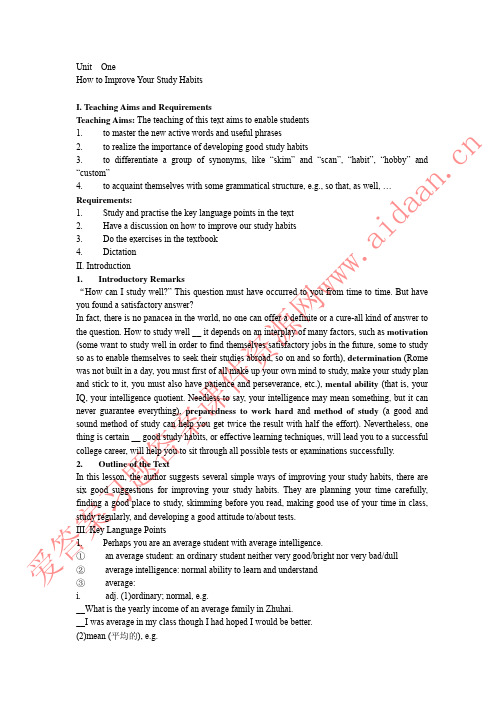
爱答案习题答案课件资源网w w w .a i d a a n .c nUnit OneHow to Improve Your Study HabitsI. Teaching Aims and RequirementsTeaching Aims: The teaching of this text aims to enable students 1. to master the new active words and useful phrases2. to realize the importance of developing good study habits3. to differentiate a group of synonyms, like “skim” and “scan”, “habit”, “hobby” and “custom”4. to acquaint themselves with some grammatical structure, e.g., so that, as well, … Requirements:1. Study and practise the key language points in the text2. Have a discussion on how to improve our study habits3. Do the exercises in the textbook4. Dictation II. Introduction1. Introductory Remarks“How can I study well?” This question must have occurred to you from time to time. But have you found a satisfactory answer?In fact, there is no panacea in the world, no one can offer a definite or a cure-all kind of answer to the question. How to study well __ it depends on an interplay of many factors, such as motivation (some want to study well in order to find themselves satisfactory jobs in the future, some to study so as to enable themselves to seek their studies abroad, so on and so forth), determination (Rome was not built in a day, you must first of all make up your own mind to study, make your study plan and stick to it, you must also have patience and perseverance, etc.), mental ability (that is, your IQ, your intelligence quotient. Needless to say, your intelligence may mean something, but it can never guarantee everything), preparedness to work hard and method of study (a good and sound method of study can help you get twice the result with half the effort). Nevertheless, one thing is certain __ good study habits, or effective learning techniques, will lead you to a successful college career, will help you to sit through all possible tests or examinations successfully. 2. Outline of the TextIn this lesson, the author suggests several simple ways of improving your study habits, there are six good suggestions for improving your study habits. They are planning your time carefully, finding a good place to study, skimming before you read, making good use of your time in class, study regularly, and developing a good attitude to/about tests. III. Key Language Points1. Perhaps you are an average student with average intelligence.① an average student: an ordinary student neither very good/bright nor very bad/dull ② average intelligence: normal ability to learn and understand ③ average:i. adj. (1)ordinary; normal, e.g.__What is the yearly income of an average family in Zhuhai.__I was average in my class though I had hoped I would be better. (2)mean (平均的), e.g.爱答案习题答案课件资源网w w w .a i d a a n .c n__What is the average yearly income of an ordinary family in Zhuhai? __The average age of the students in our class is 19.ii. n. 平均,平均数(often used in the set phrase, “on the/an average), e.g.__On the average, there are 550 Macao visitors going through Gongbei Customs a day. ④ intelligenceThe word “intelligence” may mean many things, the basic meaning is “the capacity to acquire and apply knowledge” A student with average intelligence is a student neither very bright nor very dull who does sufficiently well but wins no distinction. When we say a person is intelligent, we usually mean he or she studies and learns fast, or comes up with clever solutions to problems. e.g. intelligent quotient (IQ), an intelligent test2. This is not necessarily the case, however: But this might not be true sometimes. ① necessarily: as an inevitable result; unavoidably, inevitably, e.g. __Lung cancer is not necessarily associated with tobacco use. __Great books are not necessarily bestsellers. ② casei. the actual condition, e.g.__The majority led by Zhou, argued that this was the case.__That was not the case with the American women in our delegation.__With Internet we can communicate with people far away cheaply. But a few years ago that was not the case at all.ii. instance of a diseased condition, e.g. __Five cases of HIV have been confirmed. iii. question to be decided in a law court, e.g. __Police decided to look into the murder case.iv. Note that the word “case” is often used in some set phrases: in any case(无论如何), in no case (决不), in case (万一), in case of (如果发生), in the case of (就…而言, 至于) __I am ready to help in any case.__I couldn’t shelter behind him all the time, in any case, he wasn’t always with me. __He carries an umbrella with him in case it rains/it should rain. __In no case should we give in /lose heart.__In the case of my father, he doesn’t like fishing at all. __In case of the fire accident, please dial 119 immediately. 3. Then make a schedule or chart of your time. ① schedule (n., vt.)i. on schedule: on time (准时地,按时刻表),e.g.__Three days later, on schedule, I met with Sheldon in his office. ii. ahead of schedule: ahead of time, earlier, e.g. __We arrived at the destination ahead of schedule. iii. to schedule, according to schedule, e.g.__These operations have been successfully carried out according to schedule. ② chart, table, graphThe three words have the meaning of “图表”。
新编大学英语大学第一册教案
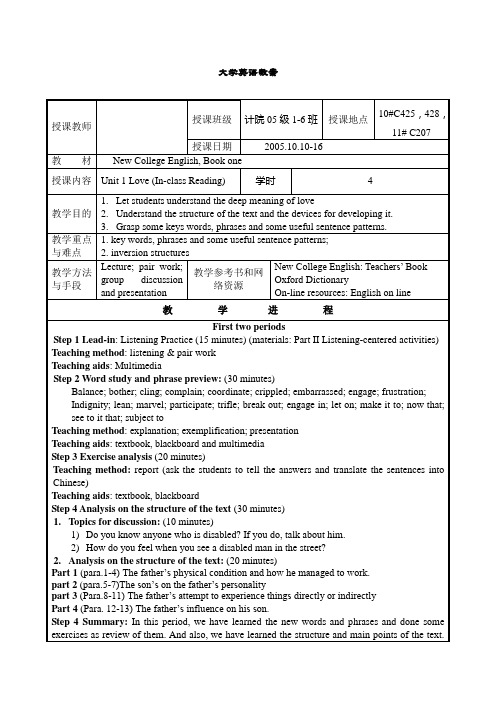
授课班级
计院 05 级 1-6 班
授课地点
10#C425,428, 11# C207
授课日期 2005.10.10-16 New College English, Book one Unit 1 Love (In-class Reading) 学时 4 1. Let students understand the deep meaning of love 2. Understand the structure of the text and the devices for developing it. 3. Grasp some keys words, phrases and some useful sentence patterns. 1. key words, phrases and some useful sentence patterns; 2. inversion structures Lecture; pair work; New College English: Teachers’ Book 教学参考书和网 group discussion Oxford Dictionary 络资源 and presentation On-line resources: English on line 教 学 进 程
Periods 3 and 4 Step 1 lead-in: listening practice (about 20 minutes) (material: CET band-4, listening part) Teaching method: listening & pair work Teaching aids: Multimedia Step 2: Analysis on the important language points. (30 minutes) 1. make it to the office 2. cling to 3. subject oneself to 4. now that… 5. inversion caused by “nor” 6. be engaged in 7. be content to do something 8. take a dive 9. see (to it) that… 10. “could/should/might/must have done” structure Step 3 Summarize the main idea of this text. (10 minutes) Teaching method: explanation; exemplification; presentation Teaching aids: textbook, blackboard and multimedia Step 4 analysis on quiz 1 (30 minutes) Teaching method: explanation; students’ report Teaching aids: Multimedia; textbook; blackboard Step 5 summary: In this period, we have first made some analyses on the text so that you can have a better understanding on the text and some useful expressions. And then we finished Quiz 1. In next period, we’ll first review what we learned, and then we’ll come to Unit 2.
新标准大英第一册Unit1-Unit5综合教程教案
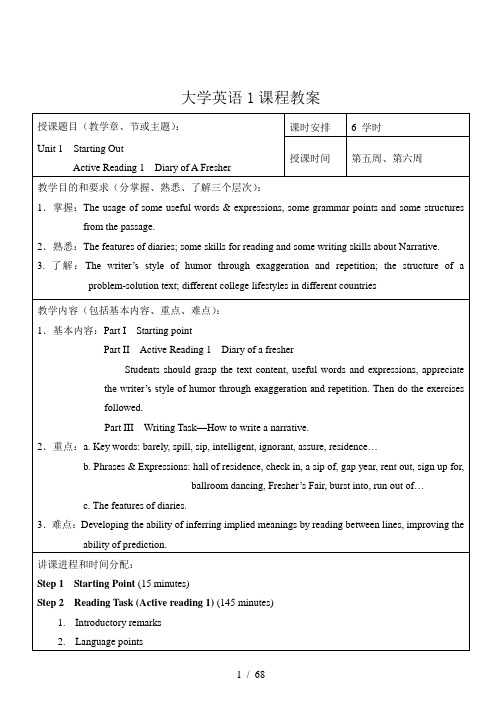
大学英语1课程教案Unit 1 Starting OutTeaching Content: Diary of A FresherLesson Type: Intensive Reading (New Standard College English Book 1)Total Time: 4.5 HoursClass/Object: Freshman (the first term)Teaching Procedures:Step 1Starting Point(15 mins)1. What do you expect to learn in the university?2.Work in pairs. Look at the photo of a university. Choose words to describe it.And then think of words to describe your own college.3. Work in pairs. Brainstorm college education objectives and what are important to you.☐finding a girlfriend / boyfriend☐studying hard and learning a lot☐meeting people and making friends☐getting a good job when you graduate☐having fun☐growing up and becoming independent☐going to parties☐doing lots of sport☐reading widely☐learning new skills and having new experiencesStep 2Introductory remarks (10 mins)How to write a diary in English1. Format:a. Write down the date, the day and the weather on the first line. The date and theday are on the left, while the weather is on the right.b. Write the body part. Write this part on the second line.2. Person:Write the diary in the first person.3. Tense:a. Past tense;b. Present tense;c. Future tense.4. Order:Write the diary in chronological order.5. StyleCasual and informal: express a personal viewpoint with reactions, reflections andfeelings.●Find out the features of Diary of a fresher.The text is a diary. There is a long tradition of writing and sometimes publishing diaries in Western literature. The text has typical features of a diary. It is a first person account, written daily about events in which the writer has participated. It is written ina casual, informal style, expressing a personal viewpoint with reactions, reflections andfeelings. The writer’s personality is evident, in this case through humor and exaggeration. It is written in the first person and with the simple present tense.Step 3 Predict the contents of the text from the title. (10 mins)Step 4 Language Points and Difficult Sentences (125 mins)⏹SundayLanguage Points1. fresher n.(BrE) first-year student / fresher (in first months of study)second-year studentthird-year student / final-year student (of a three-year program)fourth-year student / final-year student (of a four-year program) (AmE) freshmansophomorejuniorsenior2. residence n. [C] (fml)➢ a person’s home; the place where someone lives 住所;住宅➢the official house of a government minister or other public and official figure 官邸;公馆➢the fact of living in a particular place 居住;居留期间e.g. They took up residence abroad. 他们定居了国外。
新编大学英语第一册教案

课时安排:2课时教学目标:1. 培养学生的英语阅读能力,提高阅读速度和理解力。
2. 扩大学生词汇量,掌握基本语法知识。
3. 培养学生的英语口语表达能力和听力理解能力。
4. 增强学生的英语写作能力,提高书面表达能力。
教学内容:1. 单元主题:日常生活中的英语表达2. 课文:《日常生活中的英语表达》教学重点:1. 课文中的词汇和短语2. 课文中的语法知识3. 课文中的句型和结构4. 课文中的听力理解技巧教学难点:1. 词汇的记忆和运用2. 语法知识的理解和运用3. 听力理解的准确性教学准备:1. 课文教材2. 词汇卡片3. 语法讲解PPT4. 听力材料教学过程:第一课时:一、导入1. 利用图片或视频,展示与课文主题相关的日常生活场景,激发学生的兴趣。
2. 引导学生谈论自己在日常生活中遇到的英语表达,引出课文主题。
二、阅读1. 学生阅读课文,了解课文大意。
2. 教师讲解课文中的生词、短语和语法知识。
3. 学生跟读课文,模仿语音、语调。
三、讨论1. 教师提出与课文相关的问题,引导学生进行讨论。
2. 学生分组讨论,分享自己的观点和经验。
四、听力1. 学生听课文录音,回答相关问题。
2. 教师讲解听力技巧,提高学生的听力理解能力。
第二课时:一、复习1. 复习第一课时的内容,检查学生对课文的理解程度。
2. 学生互相提问,巩固所学知识。
二、口语1. 学生进行角色扮演,模拟课文中的场景,练习口语表达。
2. 教师给予指导和评价。
三、写作1. 学生根据课文主题,写一篇短文。
2. 教师讲解写作技巧,指导学生提高写作能力。
四、总结1. 教师总结本节课的主要内容,强调重点和难点。
2. 学生分享自己的学习心得。
教学评价:1. 学生在课堂上的参与度和表现。
2. 学生对课文内容的掌握程度。
3. 学生在口语和写作方面的进步。
教学反思:1. 根据学生的学习情况,调整教学内容和方法。
2. 关注学生的学习需求,提高教学效果。
大学英语(全新版)第一册电子教案
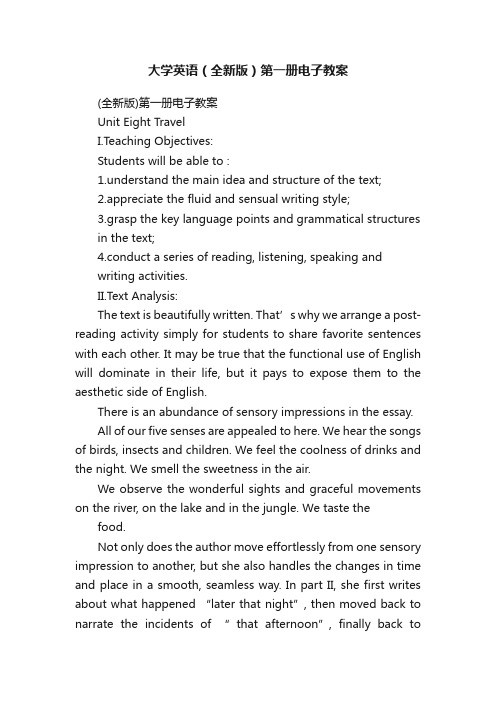
大学英语(全新版)第一册电子教案(全新版)第一册电子教案Unit Eight TravelI.Teaching Objectives:Students will be able to :1.understand the main idea and structure of the text;2.appreciate the fluid and sensual writing style;3.grasp the key language points and grammatical structuresin the text;4.conduct a series of reading, listening, speaking andwriting activities.II.Text Analysis:The text is beautifully written. That’s why we arrange a post-reading activity simply for students to share favorite sentences with each other. It may be true that the functional use of English will dominate in their life, but it pays to expose them to the aesthetic side of English.There is an abundance of sensory impressions in the essay.All of our five senses are appealed to here. We hear the songs of birds, insects and children. We feel the coolness of drinks and the night. We smell the sweetness in the air.We observe the wonderful sights and graceful movements on the river, on the lake and in the jungle. We taste the food.Not only does the author move effortlessly from one sensory impression to another, but she also handles the changes in time and place in a smooth, seamless way. In part II, she first writes about wh at happened “later that night”, then moved back to narrate the incidents of “ that afternoon”, finally back to“now”. she was sitting on a tree stump on the river bank near a palm-thatch village in Part I, then she sat in a camp in Part II, went on a journey away from the river into the jungle and finally returned to riverside village in Part III.All through these movements there is overall coherence.There is an echo—“It would be worth it”, “The Napo River: it is not out of the way. It is in the way.”III.Cultural Notes:1.Amazon (river): river in northern South America, largelyin Brazil, ranked as the largest in the world in terms ofwatershed area, number of tributaries, and volume ofwater discharged. Measuring 6,400 km (4,000 mi) fromsource to mouth, it is second in length only to the Nileamong the rivers of the world. With its hundreds oftributaries, the Amazon drains a territory of more than 6sq km (2.3 million sq mi), roughly half of which is in Brazil; the rest is in Peru, Ecuador, Bolivia, and Venezuela. It is estimated that the Amazon discharges between 34 million and 121 million liters (9 million and32 million galleons) of water per second and deposits adaily average of 3 million tons of sediment near its mouth.The annual outflow from the river accounts for one-fifth of all the fresh water that drains into the oceans of the world. The outpouring of water and sediment is so vast that the salt content and color of the Atlantic Ocean are altered for a distance of about 320 km (about 200 mi) from the mouth of the river.2.Ecuador:republic in northwestern South America,bounded by Colombia on the north, by Peru on the east and south, and by the Pacific Ocean on the west. The country also includes the Galapagos Islands in the Pacific, about 965 km(about 600 mi) west of the mainland.Ecuador straddles the equator and has an area of 272,045 sq km (105,037 sq mi). Quito is the country’s capital.Ecuador has a diverse population composed of people of European, Native American, and African descent. The majority are Mestizos, individuals of mixed European andAmerican ancestry. Most of the Native Americans live in poverty in the highlands region, where a small elite of European descent controls most of the land and wealth.Ecuador was a Spanish colony until 1822, when independence forces won a decisive victory over Spain.Ecuador has had a democratically elected government since 1979, but historically the government has alternated between civilian rule and military dictatorship. Most political conflicts involved squabbles among groups within the upper classes who controlled the nation’s wealth.3. Andes:the principal mountains of South America andone of the greatest mountain systems of the world. The Andes include some of the world’s highest peaks. Mor e than 50 of them soar higher than 6,100 m above sea level. Only the Himalayas of south central Asia are higher. The lofty plateaus and high mountain valleys of the Andes contain some of the highest permanent human settlements in the world. The Andes are the longest system of high mountain ranges on earth. They extend for more than 8000 km in a narrow belt along the western edge of the South American continent, from theTierra del Fuego in the extreme south. Along almost itsentire length, the Andes rise abruptly from the Pacificcoast. The mountains reach into seven countries.Venezuela, Colombia, Ecuador, Peru, Bolivia, Chile andArgentina./doc/e12476046.html,nguage Study:1. in the heart ofin the center of 在…中心e.g. Apartments in the heart of the city are too expensive.The metropolitan museum is located in the heart of the city.2. hushvi. be or become silent 安静下来,变得安静e.g. Having cried for half an hour, the little boy hushed.Hush, you’ll wake up the baby.3. illuminevt. shine light on 照亮,照明e.g. The sky was illumined by flashes from the volcano.My balloon was illumined by the sun that was just rising.now...now...at one time...at another time... 忽而…忽而…e.g. The junior officer who came into the room looked nervous; his eyes swiveled quickly, now this way, now that, as if he were scanning the room for danger.Now soft, now loud, now cheerful, now sorrowful, the voice of Uncle Tom told as much of the tale as his words did.5. in (all)silencewith (complete) absence of sound or noise (完全)不出声地e.g. The kids were listening to the music in the classroom, in complete silence.The soldiers stood in the glaring sin as the minutes ticked away, in all silence.6. tanglevt. catch in or as in a net, trap; mix together or intertwine in a confused mass 使卷入,使陷入;e.g. I have the sort of hair thattangles easily.The bushes were tangles with vines.7. trailextend over a surface 蔓延,伸展e.g. Roses trailing over the walls made her garden so beautiful.The strawberry is a trailing plant belonging to the rose family.8. loopvt. form or bend into a loop 使成环状e.g. She looped the scarf round her neck and went out into the cold night air.The man looped the rope over the wooden pole.9. mutevt. reduce or stop the sound of 减弱(或停止)…的声音e.g. At the sight of their teacher walking into the classroom, they muted their voices.The strings are muted throughout the closing bars of the symphony.10. dissolvev. fade away, disappear 消散,消失e.g. The characteristics of gases vary widely. Some gases are transparent, some dissolve in water, and some have a strong The panda ate the bamboo rapidly and then dissolved into the shadows.11. loosevt. untie, release 解开,放开e.g. The hunter loosed the arrow without warning.It’s not a healthy habit to loose your belt when you are full.12. slumpvi. sit or fall down heavily 重重地坐下(或倒下)e.g. Kennedy had been hit and slumped to the floor of the automobile.He slumped into a chair, completely exhausted.13. be dying to do sth. /for sth.desire (to do) sth. eagerly 非常想做某事(或得到某物)e.g. She was dying to tell them the good news that she had won first prize in the speech contest.Having worked in the sun for four hours, I was dying for a cup of tea.get one's hands oncatch hold of, find or get (sth.) 抓到,得到e.g. I wish I could get my hands on a copy of Harry Potter.The book’s here somewhere, but I don’t seem to be able to get my hands on it just now.15. take apartseparate into its different parts 拆开,分开e.g. When I was young, my parents never blamed me for taking my toys apart.When my computer broke down, I took it apart, found what was wrong, and put the whole thing together again.16. spectaculara. extraordinary; very attractive or impressive 与众不同的;引人入胜的,壮观的e.g. The British Museum, one of the most spectacular museums in the world, is renowned for its extensive and diverse collection.The Sun’s movement can produce spectacular sunrises and sunsets under the right atmospheric conditions.fringen. the outer edge or limit of sth. 边缘,边界e.g. Near the outer fringes of the solar system lies dark blue Neptune, a gas giant that probably has no true surface.With the new suburbs springing up on the fringes of the city, the urban life has changed completely.18. in detailwith specifics 详细地e.g. The police asked the victim of the robbery to describe what happened to him in detail.To maintain their place in the media world, newspapers try hard to cover news events in greater detail than television and radio do.19. opaquen. not clear enough to allow light through 不透光的,不透明的e.g. Milk is often stored in opaque containers to prevent vitamins from being destroyed by light.Usually transparent, glass can nonetheless also be opaque.20. smearmake (sth.) dirty;spread (a thick liquid, etc.) over a surface 弄脏;涂抹e.g. Don't smear the glasses; I've just polished them.My sister smeared herself with suntan oil as she sat by the swimming pool.21. flockn. a group of certain animals (动物)群in flocks a. in groups 成群地e.g. Penguins are gregarious birds and are found in flocks even at sea.Many small birds feed in flocks.22. dartvi. move suddenly and rapidly 迅疾地飞(奔)e.g. The boy darted behind the sofa as his father stormed into the living room.The lizard darted out its tongue at a fly.23. reputevt. believe, consider 认为,称为e.g. She is widely reputed to be 25 years younger than herMaradona is reputed to earn over two million pounds a year.24. stripn. a long narrow region of land or body of water; a long narrow piece 狭长的地域(或水域);条,带e.g. About 30 million people live along the Californian coastal strip.Our pay slips used to be printed on long strips of paper.25. paddlev. 用桨划(船)e.g. Canoes can be paddled by one or more persons.One of the things you will be taught at the training school is how to paddle a canoe.26. out of sightno longer in view 在视野以外,看不见e.g. The woman didn't go into the house until her daughter drove away and slowly faded out of sight.When out of sight of land, ancient seafarers used to derive clues about their location by observing the position of the sun.27. stripeda. 有条纹的e.g. She looked slim in her green and white striped shirt.The room was decorated with striped wallpaper.28. clattervi. move quickly and noisily; (cause to) make continuous loudnoises by hitting hard objects against each other 喧闹地移动;(使)咔嗒咔嗒地响e.g. She dropped the bucket and it went clattering down the stairs.His boots clattered on the stone floor, attracting our attention.29. fussvi. bustle about; give too much attention to small and unimportant matters 忙乱;大惊小怪e.g. As soon as they saw the manager the waiters began fussing around the tables.My wife was fussing over the food we were going to take. 30. slapshoot; hit with something flat 弹射;拍击e.g. Catherine responded to the man's attempt by slapping him.The pinch hitter slapped the ball.31. out of rangetoo far away to be reached, seen or heard 在射程外的,够不到的e.g. We thought that we were out of range of their rifles until the bullets started kicking up the dust in front of us.It was said the flying object was well out of range of their rockets.32. thrashvi. move wildly or violently 猛烈摆动,翻腾e.g. The swimmers were thrashing about in the water.The dog thrashed around trying to break free.33. heapn. an untidy pile of something 一堆,大量e.g. He left his books in a heap on the floor.There is heaps of time before I take the examination.34. glidevi. move quickly and silently with ease; fly through the air without power 轻快无声地走;滑翔e.g. At the sight of me she glided across the dance floor to greet me.The waiters glided between tightly packed tables bearing trays of pasta.35. swarmvi. move in a crowd 成群地移动,蜂拥e.g. A dark cloud of bees came swarming out of the hive.Panic-stricken, people swarmed to the shops, buying up everything in sight.36. hopvi. (of a person) jump on one foot; (of a bird or other animals) jump with two or all feet at once(人)单足跳,跳跃;(鸟和其他动物)齐足跳e.g. The birds hopped about and pecked the earth briskly, looking for seeds and insects.He hopped down the steps like an athlete.。
大学英语全新版第一册教案
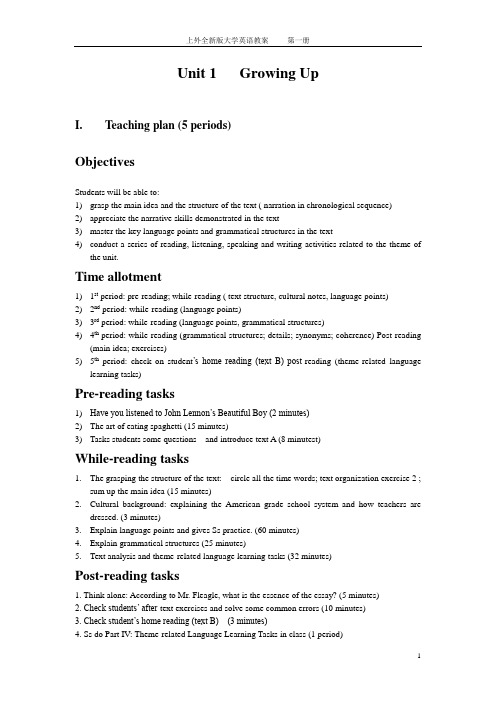
Unit 1 Growing UpI.Teaching plan (5 periods)ObjectivesStudents will be able to:1)grasp the main idea and the structure of the text ( narration in chronological sequence)2)appreciate the narrative skills demonstrated in the text3)master the key language points and grammatical structures in the text4)conduct a series of reading, listening, speaking and writing activities related to the theme ofthe unit.Time allotment1)1st period: pre-reading; while-reading ( text structure, cultural notes, language points)2)2nd period: while-reading (language points)3)3rd period: while-reading (language points, grammatical structures)4)4th period: while-reading (grammatical structures; details; synonyms; coherence) Post-reading(main idea; exercises)5)5th period: check on student‘s home reading (text B) post-reading (theme-related languagelearning tasks)Pre-reading tasks1)Have you listened to John Lennon‘s Beautiful Boy (2 minutes)2)The art of eating spaghetti (15 minutes)3)Tasks students some questions and introduce text A (8 minutest)While-reading tasks1.The grasping the structure of the text: circle all the time words; text organization exercise 2 ;sum up the main idea (15 minutes)2.Cultural background: explaining the American grade school system and how teachers aredressed. (3 minutes)3.Explain language points and gives Ss practice. (60 minutes)4.Explain grammatical structures (25 minutes)5.Text analysis and theme-related language learning tasks (32 minutes)Post-reading tasks1. Think alone: According to Mr. Fleagle, what is the essence of the essay? (5 minutes)2. Check students‘ after-text exercises and solve some common errors (10 minutes)3. Check student‘s home reading (text B) (3 minutes)4. Ss do Part IV: Theme-related Language Learning Tasks in class (1 period)5. Ask t he students‘ to prepare the next unit (2 minutes)I.Text AnalysisRussell Baker is very good at selecting details (see Part IV Writing Strategy) to prove his point. For example, in Para. 2 he creates an unfavorable image of Mr. Fleagle by describing his ―fo rmal, rigid and hopelessly out-of-date‖ eyeglasses, hairstyle, clothes, jaw, nose, and manner of speaking.What‘s more, Russell Baker employs repletion not only to make it easy for readers to follow what he is saying, but also to impress them more deeply. For example, in Para. 2, there are 9 prim’s or primly’s in as few as 3 sentences! Thus readers will have in their mind a vivid picture of what Mr. Fleagle looked like. Another example of such repetition can be found in Para. 5. Count how many I wanted‘s t here are in this paragraph (there are 5!). They help to emphasize Russell Baker‘s strong desire to write for himself.On the other hand, where this stylistic device is not justified, Baker is also expert in avoiding repetition by employing synonymous words and phrases. Here are some examples:a.dull, lifeless, cheerless, tediousb.turn out, write, compose, put downc.recapture, relived.topic, titleII.Cultural notes1.Grade schools in the US.: It is necessary to have some knowledge of grade schools in theU.S. because Ss have to realize that ―the third year in high school‖ (para. 1) equals ―the eleventh grade‖ (para. 9). U.S. students generally go through elementary schools (kindergarten to 5th or 6th grade), middle schools (grades 6-8) or junior highs schools (grades 7-9), and high schools (grades 9-12 or 10-12).2.What American teachers wear in school: Nowadays, people in the U. S. love to dresscausally. Even among those companies with a rigid dress code some now allow employees not to wear suits on Fridays. U.S. teachers were fairly formal clothes to school, but not necessarily suits and ties. Bow ties are considered even more old-fashioned than ties.3.Spaghetti and the proper way of eating it: Spaghetti is the Italian-style thin noodle, cookedb boiling and served with sauce. Usually you would put a fork into a plate of spaghetti, turnthe fork several times so that spaghetti will wind around the fork, then place the fork into your mouth. It‘s impolite to suck.nguage Points1.off and on: adv.In an intermittent manner: slept off and on last night.2.possibility: The fact or state of being possible. Something that is possible.Is it a possibility that you will work abroad?There is no possibility of his coming.The new invention contains wonderful possibilities.3.take hold: to start to have an effectThe fever was beginning to take hold.4.bore: To make weary by being dull, repetitive, or tedious:The play bored us.I'm bored with this job.It's bore to little children having to go to school every day.5.associate: To connect or join together; combine; To connect in the mind or imaginationassociate one thing with anotherWe associate China with the Greet Wall.What do you associate with such a heavy snow?6.assignment: a piece of work that is given to a particular personreceive an assignment接收一项任务What is today's assignment in history?今天历史课指定的作业是什么?He has got a new assignment.他得到一项新任命。
新编大学英语第一册教案
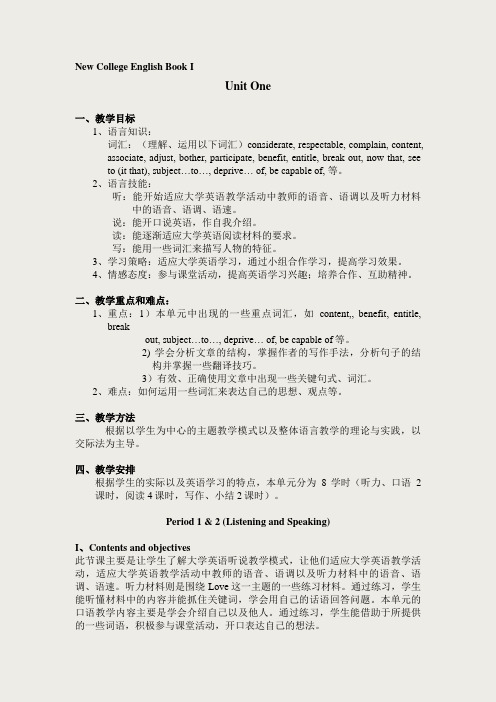
New College English Book IUnit One一、教学目标1、语言知识:词汇:(理解、运用以下词汇)considerate, respectable, complain, content, associate, adjust, bother, participate, benefit, entitle, break out, now that, see to (it that), subject…to…, deprive… of, be capable of, 等。
2、语言技能:听:能开始适应大学英语教学活动中教师的语音、语调以及听力材料中的语音、语调、语速。
说:能开口说英语,作自我介绍。
读:能逐渐适应大学英语阅读材料的要求。
写:能用一些词汇来描写人物的特征。
3、学习策略:适应大学英语学习,通过小组合作学习,提高学习效果。
4、情感态度:参与课堂活动,提高英语学习兴趣;培养合作、互助精神。
二、教学重点和难点:1、重点:1)本单元中出现的一些重点词汇,如content,, benefit, entitle,breakout, subject…to…, deprive… of, be capable of等。
2) 学会分析文章的结构,掌握作者的写作手法,分析句子的结构并掌握一些翻译技巧。
3)有效、正确使用文章中出现一些关键句式、词汇。
2、难点:如何运用一些词汇来表达自己的思想、观点等。
三、教学方法根据以学生为中心的主题教学模式以及整体语言教学的理论与实践,以交际法为主导。
四、教学安排根据学生的实际以及英语学习的特点,本单元分为8学时(听力、口语2课时,阅读4课时,写作、小结2课时)。
Period 1 & 2 (Listening and Speaking)I、Contents and objectives此节课主要是让学生了解大学英语听说教学模式,让他们适应大学英语教学活动,适应大学英语教学活动中教师的语音、语调以及听力材料中的语音、语调、语速。
新编大学英语1电子教案
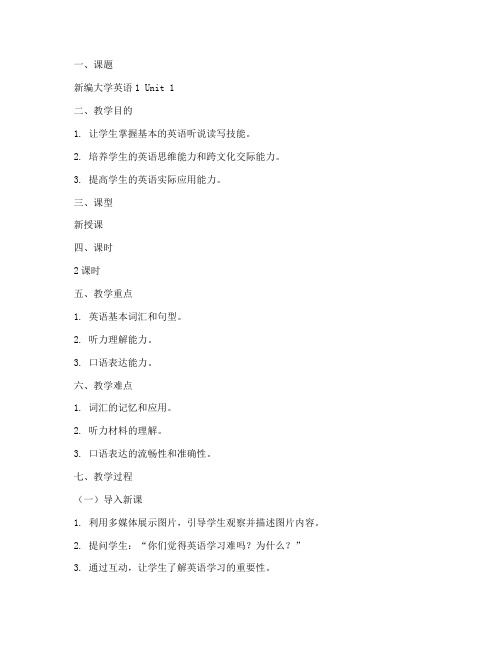
一、课题新编大学英语1 Unit 1二、教学目的1. 让学生掌握基本的英语听说读写技能。
2. 培养学生的英语思维能力和跨文化交际能力。
3. 提高学生的英语实际应用能力。
三、课型新授课四、课时2课时五、教学重点1. 英语基本词汇和句型。
2. 听力理解能力。
3. 口语表达能力。
六、教学难点1. 词汇的记忆和应用。
2. 听力材料的理解。
3. 口语表达的流畅性和准确性。
七、教学过程(一)导入新课1. 利用多媒体展示图片,引导学生观察并描述图片内容。
2. 提问学生:“你们觉得英语学习难吗?为什么?”3. 通过互动,让学生了解英语学习的重要性。
(二)讲授新课1. 词汇讲解:介绍本课重点词汇,并举例说明其用法。
2. 句型讲解:讲解本课重点句型,并进行示范。
3. 听力训练:播放听力材料,引导学生听并回答问题。
4. 口语练习:让学生分组进行口语练习,巩固所学知识。
(三)巩固练习1. 词汇练习:让学生根据所学词汇,进行填空、选择题等练习。
2. 句型练习:让学生根据所学句型,进行造句练习。
3. 听力练习:播放听力材料,让学生回答问题。
4. 口语练习:让学生进行角色扮演,巩固所学知识。
(四)归纳小结1. 总结本课所学内容,强调重点词汇和句型。
2. 鼓励学生在课后进行复习,巩固所学知识。
(五)作业布置1. 复习本课所学词汇和句型。
2. 完成课后练习题。
3. 收集有关英语学习的资料,进行阅读。
八、板书设计1. 课题:新编大学英语1 Unit 12. 重点词汇:example, importance, difficulty, etc.3. 重点句型:What do you think...? Why do you think so...?4. 教学步骤:导入新课、讲授新课、巩固练习、归纳小结、作业布置九、教具1. 多媒体设备:电脑、投影仪、音响等。
2. 听力材料:录音带、MP3等。
3. 教学课件:PPT等。
通过以上教学过程,使学生掌握新编大学英语1 Unit 1的基本知识,提高英语听说读写能力,为后续课程的学习打下坚实基础。
- 1、下载文档前请自行甄别文档内容的完整性,平台不提供额外的编辑、内容补充、找答案等附加服务。
- 2、"仅部分预览"的文档,不可在线预览部分如存在完整性等问题,可反馈申请退款(可完整预览的文档不适用该条件!)。
- 3、如文档侵犯您的权益,请联系客服反馈,我们会尽快为您处理(人工客服工作时间:9:00-18:30)。
Unit 1 Personal Relationships1. Preparation (Period 1& 2)Background InformationAll of us are involved in personal relationships. Some of these are related to family, some with fellow students or workers, and others of a variety of types. Most of these are happy, positive relationships, but not all of them. To have a positive relationship a person must invest time and interest in the other persons with whom he is associated. We all understand that our feelings and interest in other persons depend somewhat on what we have in common. Good relationships are usually valued because people who have good relationships are happier and more fun to be with.1.1 What kinds of relationship are you involved everyday?Can you complete the pairs of words about personal relationships?parent —host —husband —boyfriend —teacher —clerk —doctor —driver —employer —buyer —writer —performer —lawyer —director —policeman —interviewer —Eg: twins, family, couple, cousin, sisters, colleagues, leaders and audiencesisters and brothers, lovers, friends, neighbors, colleagues, schoolmates, fellow workers,…Are they important for your daily life or study? Why? List one example and explain it.1.2 Of all the relationships, which one do you think is easier to be established at the beginning of your college life? Why?A StoryListen to a short story and complete the following sentences:1. The story took place at the time of ______________________________________.2. The relationship between the woman and the little boy is _________.3. The woman led the little boy into the store because ______________________________.4. The woman bought the boy______________________________.5. ―Are you God…‖ here means ____________.原文:They came back outside into the street and the woman said to the child, ―Now you can go home and have a very happy holiday.‖ The little boy looked up at her and asked, ―Are you God, Ma’am?‖ She smiled down at him and replied, ―No, son, I’m just one of his children.‖ The little boy then said, ―I knew you had to be a relative of God.‖Welcome to Our Group!Introducing Yourself to Your Group Members Locationprovince 省 city 市county 县town 镇village 村in the suburbs of 在…的郊区high/middle school 中学key high school 重点中学high school attached to附属中学Personalityfrank 坦率的honest 诚实的outgoing 外向的shy 胆怯的introverted 内向的enthusiastic 热情的Hobbiesstamp-collecting 集邮 sports 运动reading 阅读watching TV 看电视 drawing 绘画photography 摄影 calligraphy 书法traveling 旅游shopping 购物surfing the net 网上冲浪playing cards 打牌fishing 钓鱼like 喜欢be keen on 喜爱prefer 比较喜欢favorite 最爱dislike 不喜欢Discussion in Pairs1. What is your viewpoint of the interpersonal relationships nowadays?2. If you were the woman, what would you do? Try to explain it.3. In our life, some people are open while some others are reserved. Which type do you prefer? Why?Listen to a passage and answer questions:acquaintance 熟人intimate 亲密的harmonious 和谐的t olerate 容忍Questions :1. According to the passage, what is the word ―friend‖?It covers a wide range of meanings as a classmate, a nodding acquaintance, a coworker, etc. 2. Why does everyone need friendship?We need help from, and also give help to, others.3. Why do modern people attach more importance to friendship?As life is full of difficulties and conflict, we need friends to support and help us and give us warnings against danger.原文We Need FriendsThe word, ―friend‖, covers a wide range of meanings. It can be a nodding acquaintance, a classmate, a partner, a playmate, or an intimate colleague. Everyone needs friendship. No one can sail the ocean of life single-handed. We need help from, and also give help to, others. In modern times, people attach more importance to relationships and connections. As life is full of difficulties and conflict, we need friends to support and help us. Our friends give us warnings against danger. Our friends offer us advice with regard to how to deal with various situations.Proverbs and SayingsA friend in need is a friend indeed.A friend is best found in adversity.患难见真情。
A hedge between keeps friendship green.君子之交淡如水。
A near friend is better than a far-dwelling kinsman.远亲不如近邻。
In China1. 有难同当,有福共享。
People can not only share bitterness, hardship but also happiness with their friends.2 . 一个篱笆三个桩,一个好汉三个帮。
As one fence needs three stakes, a good guy needs three fellows.3.在家靠父母,出门靠朋友。
It is your parents that you can rely on at home, but it is your friends that you can count on when out in the society.4. 为朋友两肋插刀People can take any risks, even risk of their lives to help their friends in trouble.5. 君子之交淡如水,小人之交甘如醴。
